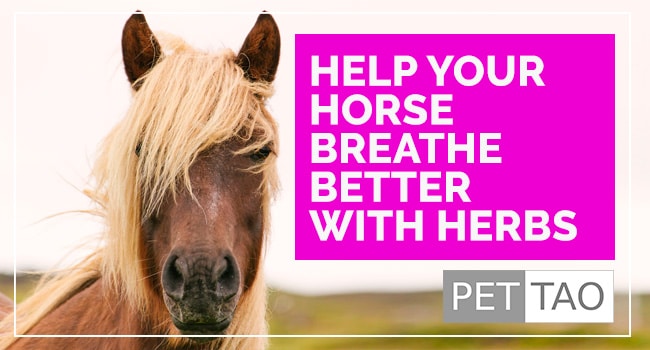Breathing Problems in Horses
Second, only to lameness, respiratory issues are very common and require veterinary attention.
What Causes Horse Breathing Problems?
Many different things cause equine breathing difficulties.
Some common causes are:
- Ammonia from bedding
- Bacteria and bacterial toxins
- Cold air (similar to human “ski asthma”)
- Dust and forage mites
- Lung bleeding during exercise
- Medication reactions
- Mold and fungi
- Mycoplasma
- Pollen
- Pulmonary embolism or thrombosis
- Upper airway obstruction
- Viruses
Symptoms of Horse Breathing Problems
If your horse is having breathing problems of any kind, you should first see the vet rule out serious health issues.
Some common signs of equine breathing problems are:
- Abnormal breathing while exercising
- Blood in nostrils after exercise
- Coughing
- Frequent swallowing during exercise
- Increased resting respiratory rate
- Increased body temperature
- Labored breathing at rest
- Nasal discharge
- Poor performance during exercise
- Slow recovery after exercise
If your horse has one or more of the above symptoms, your horse needs to see the vet.
Western Treatments for Horse Breathing Problems
Standard Western treatment of equine breathing problems involves prescription medications.
Most veterinarians prescribe antibiotics for bacterial infections.
Pharmaceutical bronchodilators open the airways, clear mucus, and allow easier breathing.
Anti-inflammatories reduce inflammation and help reduce lung damage.
Some vets recommend high doses of antioxidants to reduce respiratory symptoms.
How Su Zi Jiang Qi Herbal Formula Helps Horse Breathing Problems
Some veterinarians recommend pharmaceuticals to help with horse breathing problems.
Often, though, holistic veterinarians and horse lovers prefer trying something natural first.
herbs provide a gentle, tonic alternative for many horses with breathing issues.
Plus, most herbs don’t have side effects.
Su Zi Jiang Qi: Western Philosophy
Su Zi Jiang Qi helps horses suffering from the following Western diagnoses:
- Asthma
- Chest Pain
- Collapsed Trachea
- Dyspnea
- Excessive salivation
- Shortness of breath
Su Zi Jiang Qi: Eastern Philosophy
Eastern medicine treats a disease’s root cause(s) rather than symptoms.
Accordingly, TCVM veterinarians evaluate equine breathing problems differently than Western veterinarians.
TCVM vets look for signs of imbalance.
Su Zi Jiang Qi helps horses with the following TCVM signs:
- A pale, wet tongue
- A deep, weak or fast pulse
- Qi Stagnation and Excess Damp in the Upper Jiao and Qi/Yang Deficiency in the Lower Jiao
How Su Zi Jiang Qi Works
Su Zi Jiang Qi is a TCVM blend of 10 different Eastern herbs.
The herbs perform synergistically, balancing systems and meridians in the body.
Su Zi Jiang Qi addresses the underlying causes leading to breathing problems in horses.
The underlying cause of any disease is always an imbalance somewhere in the body.
Su Zi Jiang Qi alleviates your horse’s imbalances while treating the symptoms of equine breathing problems.
According to Traditional Chinese Medicine, Su Zi Jiang Qi works by:
- Transforming phlegm to stop cough
- Strengthening Kidney Yang to relieve asthma
- Descending Qi from the Upper Jiao to the Lower Jiao
What Are the Ingredients in Su Zi Jiang Qi?
The main ingredients in Su Zi Jiang Qi are:
- Ban Xia dries up dampness and transforms phlegm
- Da Zao tonifies Qi and harmonizes
- Dang Gui nourishes and activates Blood
- Gan Cao tonifies Qi and harmonizes
- Gan Jiang warms Kidney and dispels cold
- Hou Po transforms phlegm and stops asthma
- Qian Hu transforms phlegm moves qi
- Rou Gui warms Kidney and dispels cold
- Zi Su Ye dispels Wind-cold and soothes Lung Qi
- Zi Su Zi descends Qi to stop asthma and stop cough
Dr. Huisheng Xie, the founder of the Chi Institute in Reddick, FL, created Jing Tang’s Su Zi Jiang Qi specifically for animals.
Su Zi Jiang Qi comes from Chen Shi Wen’s Imperial Grace Formulary of the Tai Ping Era, written in 1080.
Su Zi Jiang Qi works best when combined with plenty of water and case-appropriate exercise.
Get Su Zi Jiang Qi at TCVM Pet Supply
Note: Information on this site is for educational purposes only and is not meant to substitute the advice provided by your own veterinarian.
Sources:
- “Dr. Xie’s Jing Tang Herbal.” Dr. Hushing Xie. Extracted from https://store.tcvmherbal.com/store/viewFormula.asp?fid=293.
- “Respiratory Problems in Horses: How to Recognize, Avoid and Manage Them” by David Marlin, Scientific and Equine Consultant. February 9, 2015. Extracted
- horses-how-to-recognise-avoid-and-manage-them-dr-david-marlin.








